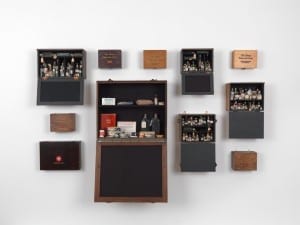Review by Jareh Das
Tracey Emin’s extensive solo presentation at London’s Hayward Gallery is an exhibition which may conjure some scepticism. Emin is an artist infamous for her sexual provocation and YBA status and at times this is with little consideration made for her diverse and expansive oeuvre. Born in Croydon, Emin’s is synonymous with the seaside town of Margate due to her continual reference to her childhood and teenage years, in the town which arguably gave her so much, but at the same time took away so much from the young artist.
This survey of her life’s work is vast and multi-layered. It presents video, sculpture, drawings, blankets, archival material and site specific interventions spilling out onto the Gallery’s outdoor terrace. One wonders what happens to these outdoor sculptures when the heaven’s open? My guess is they remain, deteriorate and decay for the duration of the exhibition. This idea of decay is one that runs through a lot of Emin’s works presented in Love Is What You Want – loss of child hood, loss of a child, loss of innocence, losing one’s mind, loss of love and so forth. This enduring loss seems to span every period of the artists’ life, and manifests itself through the art which is presented as fragments of an autobiographical and continually evolving story.
The exhibition is categorised into eight main rooms: Blankets, Neons, Films, Memorabilia, Drawing, Paintings, Sculpture and Writing and the work occupies every possible space in the Hayward. Writing plays such an integral part in her works and this can be seen in Neons, Blankets, Paintings, Drawings. One of her blanket pieces Hotel International (1993), for example, has poignant statements such as ‘You’re good in bed’, ‘Hotel International: The Perfect Place to Grow’. Taking its name from a hotel owned by Emin’s farther in Margate, the work comments on her childhood by piecing memories in a patch-work quilt manner. There are words all over the blanket; notes, cryptic messages which read like diary entries which transforms the piece into a quilt of memories for the viewer to decipher and interpret as they feel fit. It also alludes to general characteristics of hotels, a place that can often be associated with dangerous liaisons, sex and secrecy. Love is What You Want by Tracey Emin, 2011, the neon title piece for the exhibition is simple and direct. We all want love whether we admit it or not. Love manifested in different forms as well as human obsession with this phenomenon.
A large-scale sculpture sits alongside the wall of blankets titled Knowing My Enemy (2002). This dilapidated pier with a beach hut on its end is an ode to Tracey’s father who she refers to as constantly coming in and out of her life. It is fragile looking piece, seemingly about to collapse. This recurring autobiography is present through all of Emin’s works, her life becomes art and vice versa. There is angst juxtaposed with trauma, evident in Exploration of the Soul (1994), a text revealing her rape at the age of thirteen. The highlight of the exhibition, however, is the drawing room in which intricate drawings of the female form fill the third floor gallery. Some sketches on fabric embroidered on sheets, pillow cases and cloth, drawings in blue ink, with the centre piece being an animated drawing projected on a screen, a focal point of this room, showing off Emin’s approach to drawing and technique used. Sometimes the dress is worth more than the money (2001) a four minute film originally commissioned by Beck’s Future 2, sees Emin in a traditional Cypriot wedding dress, with money pinned all over it. Dancing nonchalantly across an arid Mediterranean landscape, Emin based this film on a childhood fantasy about a wedding dress she had once seen in a shop window and with a film score from The Good, The Bad and The Ugly Emin’s appreciation of Western Movies is evident.
Why I never became a dancer (1995) is quite a humorous piece with a 1990s dance rave soundtrack. Here Emin is in a dance studio with a short curtain hairstyle, dressed in denim cut-off, dancing fervently while narrating how dancing became a means of escape for her troubled teenage years in Margate. This image is testimony to the fact that Tracey Emin is a fighter, her fierce ambition and resistance are what liberate her work from being merely provocative. She wants no sympathy and although it’s easy to be sceptical about her intentionality, Emin talent is one that should not be dismissed, her practice is so expansive mid-career and we should all look forward to the next stages of this talented artist’s career.
Tracey Emin: Love Is What You Want is on until 20 August.
southbankcentre.co.uk
Aesthetica Magazine
We hope you enjoying reading the Aesthetica Blog, if you want to explore more of the best in contemporary arts and culture you should read us in print too. In the spirit of celebration, Issue 41 includes a piece on Guggenheimn Bilbao where the Luminous Interval features internationally acclaimed artists such as Louise Bourgeois, Kiki Smith and Damien Hirst, ArtAngel’s new commission at MIF, Bruce Nauman’s retrospective at The Kunsthalle Mannheim and Cory Arcangel’s Pro Tools at the Whitney in NYC. You can buy it today by calling +44(0)1904 479 168. Even better, subscribe to Aesthetica and save 20%. Go on, enjoy!
Image:
Knowing My Enemy (2002)
Copyright the artist
Photo: Stephen White
Courtesy White Cube





